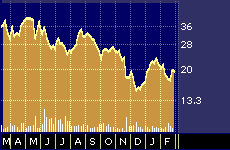
Analyst Pick: KEMET
Analyst Pick: KEMET
By Hal Plotkin
CNBC.com Silicon Valley Correspondent

Who: Martin Whitman, chief investment officer at the Third Avenue Value Fund {TAVFX}.
Stock Pick: KEMET Corp. {KEM}
Recent Price: $19
Appreciation Potential: Could hit $40 over next 12 to 18 months.
Reason to Buy: Potential takeover target.

KEMET 52-week stock performance
The tech sector is going to need a whole lot of capacitors when it recovers, says Martin Whitman, chief investment officer and portfolio manager of the Third Avenue Value Fund.
That’s one of the main reasons Whitman owns and recommends shares of KEMET Corp., the largest manufacturer of solid tantalum capacitors and the fourth largest manufacturer of multi-layer ceramic capacitors in the world. The company’s products, which are also known as passive components, are used in virtually everything electronic, from cell phones to set-top boxes to computer game consoles.
Whitman says the stock, now trading at about 5.5 times trailing 12-month earnings, is the best value among his current holdings.
“The company is coming off a super, super year, is extremely well-financed, and serves some fantastic growth markets,” he says. “I’m pretty convinced the next peak will be better than the last peak.”
KEMET’s stock is trading well below its 52-week high of $44 a share. But Whitman is betting it will come roaring back, although perhaps not immediately. Instead, he says investors will eventually rediscover what he says is an undervalued gem. Throw into the mix the company’s attractiveness as a potential takeover candidate, he says, and you’ve got the makings of a winning stock pick.
KEMET Corporation was originally created as a leveraged buyout put together by Citicorp Ventures, the investment-banking arm of the giant financial services firm, which remains a major shareholder.
“That’s one of the reasons I think the company is still in play,” says Whitman. “It would certainly be an asset for the right company. I think they could get somewhere around $40 a share as a takeover price.”
In late January, KEMET reported a 74% net increase in sales, to $374.9 million, for the quarter ended December 31 as compared with $215.1 million for the same quarter last year. Earnings came in at $1.10 per diluted share, as compared with $0.22 per diluted share for the same period last year. It was the company’s sixth consecutive quarter of record sales and earnings.
The good news, however, was tempered by the firm’s warning of flat revenue growth for the March quarter, when unit sales are projected to decline by 10 to 15 percent because of inventory issues and the economic slowdown. Despite the anticipated decline in unit sales, though, the company says there should be little or no decline in revenue over the next quarter, in part, because of its plan to pass through more of the cost of the materials used in its components.
“Barring a recession, we expect fiscal 2002 revenue growth to be in excess of 10 percent over fiscal 2001 revenues with earnings of at least $3 per share,” KEMET’s chairman and CEO David E. Maguire reported in his formal guidance to analysts when the numbers were released.
The projected revenue growth slowdown led to a sell off in KEMET shares post-announcement, which further whets Whitman’s appetite for the stock.
“I couldn’t care less what the market is doing or what other analysts think,” says Whitman, who won Morningstar’s Portofolio Manager of the Year award in 1990, a time period with some similarities to current market conditions.
Whitman doesn’t try to time the market but instead looks for value stocks, which he holds on to until they’re more widely discovered.
“I put no emphasis on the type of things other analysts do, such as quarterly earnings,” says the well-known iconoclast. “Instead, we use the same analytic techniques others use to buy businesses. But we apply it to stocks.”
In short, Whitman says he likes the stock because he likes the business. He says the company is a market-leading seller of components that will be absolutely critical when the economy recovers, is well managed and more than adequately capitalized. And because its components are used in a wide variety of devices, the company is more insulated than suppliers whose businesses are concentrated in more limited end-user markets.
KEMET’s strong balance sheet includes $246 million in cash and $100 million in long-term debt, as of the beginning of the last quarter.
“Our strategy is to live through the tough periods with companies that are in a very strong industry position,” says Whitman. “I don’t know what the timeline is, but if you suppose I am right we could see the stock at a modest 15 times earnings at the next peak.”


